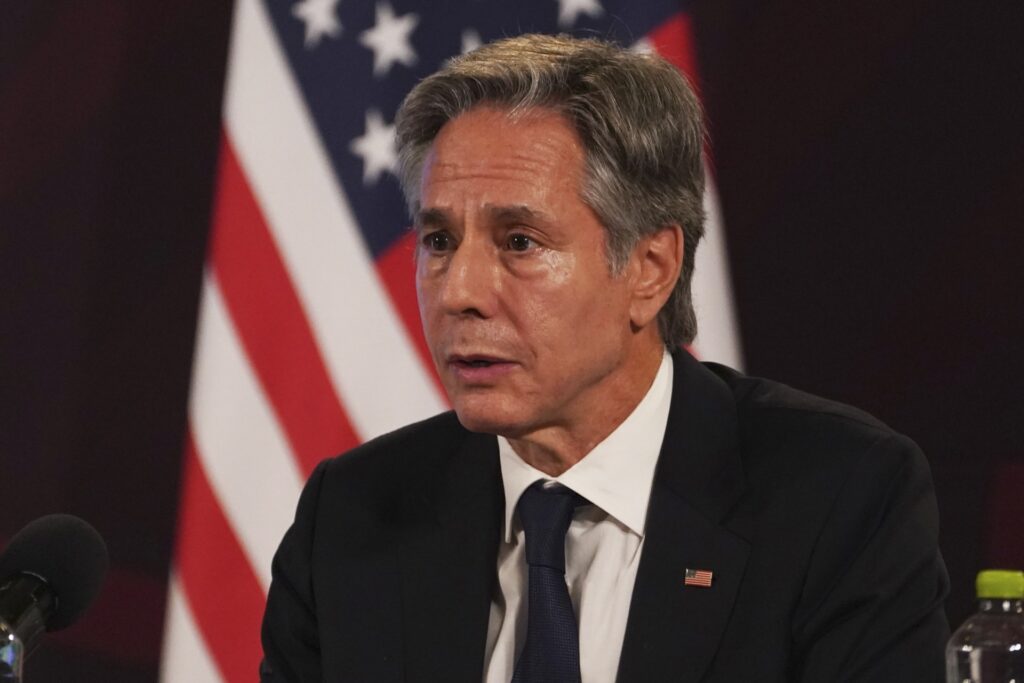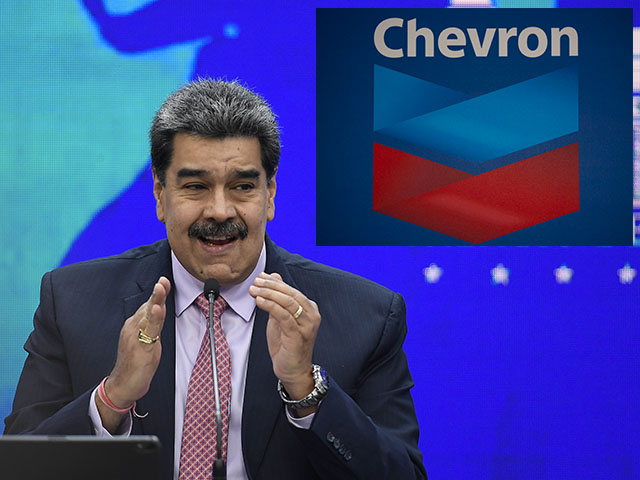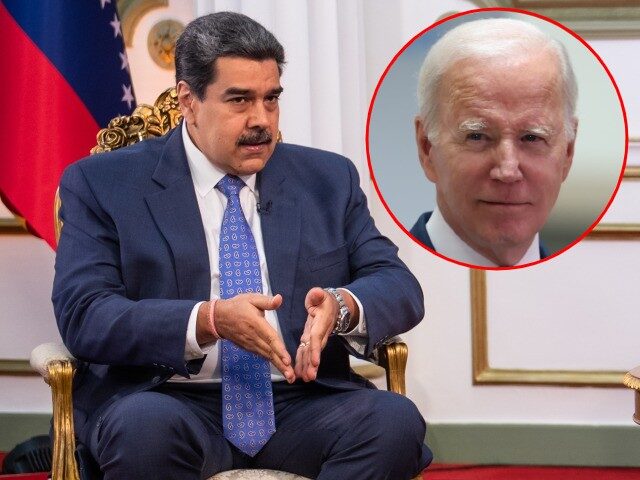CARACAS, Venezuela — The administration of President Joe Biden and the socialist regime of Venezuela are in talks that could lead to Washington lifting more oil sanctions, according to a report published by Reuters on Monday.
If granted, the prospective oil sanctions relief would come at a time when Venezuela is moving ahead with a joint plan alongside the violent, anti-American regimes of Iran and Syria to build an oil refinery in the Syrian town of Homs, yielding profits for all three regimes.
The planned oil refinery in Homs and its prospective profits may potentially fund international terrorism. Despite being a Shiite regime, Iran has maintained deep ties with the Sunni Hamas terrorist organization, providing financial and military backing. Hamas executed an unprecedented terrorist attack and invasion of Israel over the weekend whose death toll surpassed 1,000 as of Tuesday, targeting residential communities, a music festival, and other civilian locations.

Palestinians celebrate by a destroyed Israeli tank at the Gaza Strip fence east of Khan Younis Saturday, Oct. 7, 2023. (AP Photo/Hassan Eslaiah)
The Maduro regime itself maintains longstanding ties with both Iran and Palestinian groups. The socialist regime, which broke diplomatic ties with Israel in 2009, justified Hamas’ heinous actions against Israel by blaming them on the alleged “impossibility of the Palestinian people to find in the multilateral international law a space to assert their historical rights.”
Iran has provided significant aid to the Maduro regime in the past year, particularly in restoring its rundown oil refineries after more than two decades of socialist mismanagement left Venezuela’s oil industry in a near-ruined state. Since last year, Iran has also begun refining its own oil in Venezuela’s repaired refineries.
The Maduro regime is long suspected of having close ties to the Iran-backed Shiite terrorist group Hezbollah, going as far as to reportedly provide Venezuelan regular and diplomatic passports to members of the terrorist organization that grant them greater freedom of movement around the world.
The Reuters report, which cites five unidentified sources, stated that the sanctions relief being negotiated would allow at least one additional oil company to extract Venezuelan oil to be used in repaying debts if socialist dictator Nicolás Maduro agrees to resume negotiations with representatives of the Venezuelan establishment “opposition” in Mexico. Those negotiations have remained frozen since November.
The “opposition” talks are an approach American Secretary of State Antony Blinken aggressively pressured both sides into for much of 2022 as a path towards holding “free and fair” elections. Although multiple rounds of negotiations between the Maduro regime and the “opposition” have taken place since the early 2000s, none of them have produced any meaningful results toward restoring democracy in Venezuela.

U.S. Secretary of State Antony Blinken speaks during a press conference after a meeting on security at the National Palace in Mexico City, Thursday, Oct. 5, 2023. (AP Photo/Marco Ugarte )
The United States — along with other countries such as Canada, the United Kingdom, and the European Union — has imposed sanctions on Maduro and high-ranking members of his regime in response to the myriad human rights violations they have committed against their own people. In 2019, the United States, during the administration of former President Donald Trump, sanctioned Venezuela’s state-owned Petróleos de Venezuela (PDVSA) oil company, imposing a ban on buying Venezuelan oil.
Last year’s negotiations in Mexico — despite not yielding any tangible results towards free and fair elections — saw the Biden administration award Maduro oil sanctions relief in the form of a license issued by the Department of the Treasury’s Office of Foreign Assets Control (OFAC) to California-based Chevron that allows Chevron to resume oil production and exports from Venezuela to the United States.
The Chevron license has been reportedly instrumental for Venezuela’s surging oil exports. The sanctions relief has not only allowed larger quantities of Venezuelan oil to enter American markets, it has also led to a 113-percent growth in trade between Venezuela and the United States in 2023.
Reuters’ report stated that one of the companies that may be issued a license as a result of the negotiations is French oil company Maurel & Prom, one of PDVSA’s joint partners. Reuters added that a “growing list” of companies are lining up to request similar authorizations so they can cash in on pending debt in Venezuela and reanimate oil and gas production alongside PDVSA.
The negotiations toward the new oil sanctions relief, according to Reuters, have taken place in Doha, Qatar, since last year between representatives from Caracas and Washington. Alleged anonymous sources from Washington confirmed to Reuters that the talks have progressed substantially in recent weeks, but remarked that it would be premature to talk about final agreements as the negotiations are ongoing.
Reuters’ latest report follows a different report published over the weekend by the Venezuelan news website Efecto Cocuyo claiming that the Maduro regime is slated to resume negotiations in Mexico with the Venezuelan “opposition” after almost a year. The Maduro regime’s willingness to resume negotiations, according to the report, follows six weeks of talks between representatives from the Biden administration and the Maduro regime.

A Chevron Global Technology Services Company logo is seen at an administrative office in Caracas on November 29, 2022. (YURI CORTEZ/AFP via Getty Images)
The recently announced deal between the United States and Venezuela to deport Venezuelan migrants who illegally crossed the Mexico-U.S. border after July 31, and an agreement to “not interfere” in the “opposition’s” upcoming primary election process, are some of the points allegedly agreed upon between the U.S. and Venezuela.
The Maduro regime is preparing to hold a sham presidential election sometime in 2024 in which it has offered no meaningful assurances of fair play. The Venezuelan establishment “opposition” is preparing to hold a primary election later in October to pick a candidate to go on that ballot against Maduro in next year’s election. Former lawmaker María Corina Machado, who is set to win the primary election by a wide margin, is presently ineligible to run against Maduro after the socialist regime banned her from holding any public office until 2030.
In the past year, Maduro, who most recently organized a sham presidential election in 2018, has repeatedly insisted that there will be no “free and fair” elections in Venezuela until all sanctions on his regime are first lifted, a demand the socialist regime has branded “sanctions-free fair elections.”
Reports published in August suggested that the Biden administration is considering granting a temporary lifting of some or all of the oil sanctions imposed on the Maduro regime in exchange for “free and fair elections” in Venezuela.
Christian K. Caruzo is a Venezuelan writer and documents life under socialism. You can follow him on Twitter here.

COMMENTS
Please let us know if you're having issues with commenting.